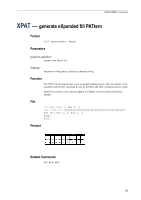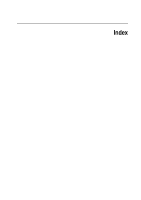Kyocera KM-6030 PRESCRIBE Commands Command Reference Manual Rev 4.8 - Page 401
Xbuf
 |
View all Kyocera KM-6030 manuals
Add to My Manuals
Save this manual to your list of manuals |
Page 401 highlights
PRESCRIBE Commands XBUF - define a BUFfer name Format XBUF buffer-name[,[data-length]]; data-string;ENDB; Parameters buffer-name: name of the buffer that contains XBAR data data-length: length of data in bytes, terminated with a semicolon data-string: data to be encoded, terminated with a semicolon immediately followed by an ENDB command (256 international characters or binary data) Function The XBUF command defines/undefines a buffer that contains actual data for the two dimensional barcodes. The buffer name can be any length but only the first four characters count. The rest will be ignored. The distinction between upper and lowercase letters is also ignored. For example, the following names are all the same. • ABCD • abcd • ABCDE • Abcdxyz The name must start with a letter, but the other characters can include digits and special symbols such as hyphens. For example, F-1 and GRY-2 are valid buffer names. As the above Format instruction implies, the XBUF command sequence can have two other formats implementing the different functions as follows: XBUF buffer-name,; data-string;ENDB; Note the comma ( , ) placed between the buffer-name and ";". As is the case of XBAR, this format allows that data-length can be omitted, 0, negative value, or non integer, the comma after buffer-name must be left in place, however. Then data-string is counted all characters until the program encounters ";ENDB;". It is necessary to have no space or linebreak between ";" and "ENDB;". The XBUF command sequence with no comma and data-length specified XBUF buffer-name; is used to delete the buffer name from the printing system memory. The XBUF command sequence with no comma, buffer-name and data-length specified XBUF; 391















